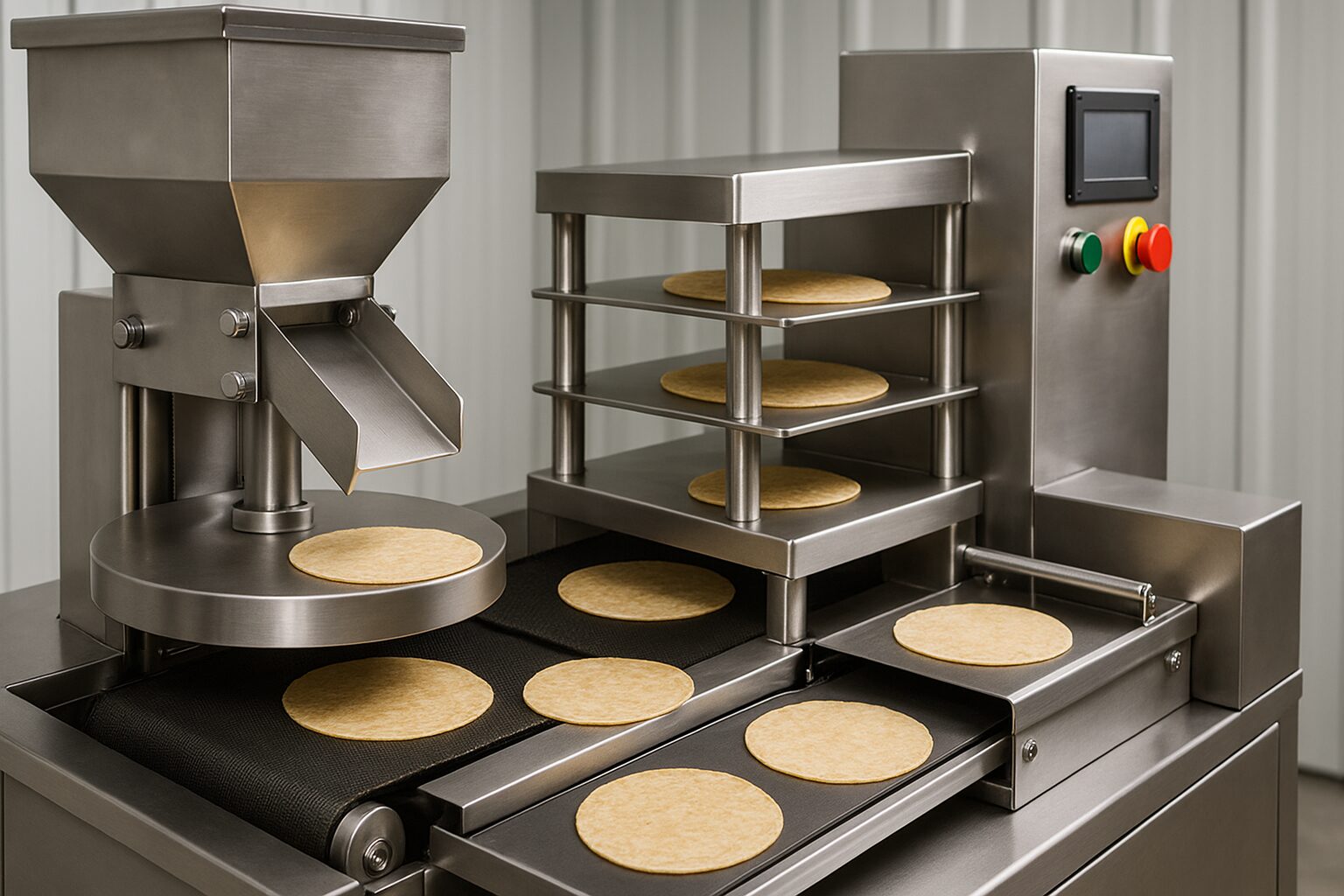In the bustling world of foodservice, efficiency and consistency are key to staying competitive. Whether it’s a local taqueria or a high-volume restaurant, preparing tortillas by hand is no longer practical for many commercial kitchens. That’s where the commercial tortilla making machine comes in—a powerful tool that saves time, reduces labor, and ensures quality in every batch.
Let’s explore how these machines work, what to look for, and why they’re transforming kitchens across the globe.
What Is a Commercial Tortilla Making Machine?
A commercial tortilla making machine is a high-capacity device designed to mix, press, cook, and stack tortillas automatically or semi-automatically. These machines are built to handle large production loads, turning raw dough into perfectly shaped, cooked tortillas in seconds.
From small countertop models for boutique restaurants to industrial machines that can produce thousands per hour, there’s a size and type for every need. Most modern machines are built with stainless steel, digital controls, and customizable features to ensure hygiene, precision, and versatility.
Why More Kitchens Are Turning to Tortilla Machines
Restaurants, catering businesses, and food manufacturers all face similar challenges—limited staff, rising costs, and high demand for consistency. A tortilla machine solves multiple problems at once:
- Labor Savings: One machine can replace multiple staff members who would otherwise spend hours rolling and cooking tortillas.
- Uniform Quality: Each tortilla comes out with the same shape, thickness, and cook level.
- Speed: Some commercial models can produce up to 60 tortillas per minute.
- Versatility: Machines can often be adjusted to produce different sizes and types—corn, flour, or even specialty grain tortillas.
Types of Commercial Tortilla Machines
1. Manual Feed Tortilla Machines
These are best for small businesses with moderate tortilla output. Operators feed dough balls manually, and the machine takes care of pressing and cooking. They’re affordable, compact, and easy to operate.
2. Semi-Automatic Tortilla Machines
These machines automate part of the process, typically feeding and pressing, while still requiring some manual supervision. Great for mid-sized restaurants and food trucks looking to scale production without a full-scale investment.
3. Fully Automatic Tortilla Machines
Perfect for industrial kitchens and large-scale food production facilities. These machines do it all—mixing, portioning, pressing, baking, and stacking. Operators can simply load the ingredients and let the machine handle the rest.
Key Features to Consider When Buying
When shopping for a commercial tortilla maker, it’s not just about the speed—it’s about performance, durability, and customization. Here are features to look for:
- Adjustable Thickness and Diameter Settings: Ensures you can produce different types and sizes of tortillas.
- Non-Stick Surfaces: Reduces waste and makes cleaning easier.
- Programmable Settings: For consistent results across different batches.
- Safety Features: Including emergency shut-offs and thermal controls.
- Energy Efficiency: Machines with eco-friendly certifications help reduce your operating costs.
Materials and Construction Matter
Look for machines constructed with food-grade stainless steel. Not only does this ensure compliance with health standards, but it also guarantees long-term durability. Inferior materials can warp under high heat or rust, leading to safety hazards and production delays.
Cost vs. Value: What’s the ROI?
The upfront cost of a commercial tortilla machine can vary widely—from a few thousand dollars for small units to tens of thousands for industrial systems. But the return on investment is significant. Consider the labor saved, the increase in production, and the improved product consistency.
For example, a restaurant producing 1,000 tortillas a day by hand might need 3-4 staff members dedicated solely to this task. A machine can do the same work in a fraction of the time, freeing up employees for other tasks or reducing total labor needs altogether.
Success Stories from the Field
One family-owned taqueria in Texas saw a 40% increase in daily output after investing in a commercial tortilla maker. With fewer customer complaints about inconsistencies and faster service times, their reviews and customer retention soared.
Another manufacturer that supplies frozen tortillas to grocery stores switched from manual production to an industrial tortilla line and cut their turnaround time in half—while doubling their order capacity.
Maintenance and Cleaning Tips
Regular maintenance ensures your machine performs at peak levels. Always:
- Clean daily with food-safe cleaners.
- Check belts and rollers for wear.
- Calibrate temperature settings weekly.
- Lubricate moving parts as recommended by the manufacturer.
Most top-tier machines come with warranty coverage and tech support, which adds to their value in the long run.
Where to Buy a Reliable Machine
When considering where to purchase, always choose suppliers with a reputation for quality and service. One popular destination is https://www.tortillamakermachine.com/tortilla-making-machine/, which offers a wide range of commercial machines suitable for businesses of all sizes. They provide excellent customer support and a variety of models to fit specific production needs.
Future of Tortilla Production: Smart Automation
The tortilla industry is embracing smart tech, with machines now featuring AI-based monitoring, remote diagnostics, and data analytics. These innovations allow operators to track performance, predict maintenance needs, and fine-tune settings for even better results.
Final Thoughts
Investing in a commercial tortilla making machine isn’t just about automation—it’s about scaling your business, maintaining quality, and meeting growing demand. With the right machine, food businesses can elevate their production process and deliver consistent, high-quality tortillas every time.

































